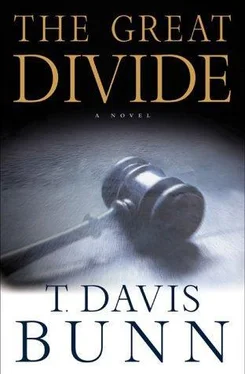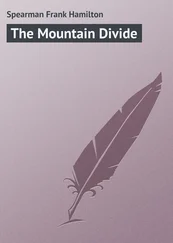T. Bunn - The Great Divide
Здесь есть возможность читать онлайн «T. Bunn - The Great Divide» весь текст электронной книги совершенно бесплатно (целиком полную версию без сокращений). В некоторых случаях можно слушать аудио, скачать через торрент в формате fb2 и присутствует краткое содержание. Жанр: Триллер, на английском языке. Описание произведения, (предисловие) а так же отзывы посетителей доступны на портале библиотеки ЛибКат.
- Название:The Great Divide
- Автор:
- Жанр:
- Год:неизвестен
- ISBN:нет данных
- Рейтинг книги:5 / 5. Голосов: 1
-
Избранное:Добавить в избранное
- Отзывы:
-
Ваша оценка:
- 100
- 1
- 2
- 3
- 4
- 5
The Great Divide: краткое содержание, описание и аннотация
Предлагаем к чтению аннотацию, описание, краткое содержание или предисловие (зависит от того, что написал сам автор книги «The Great Divide»). Если вы не нашли необходимую информацию о книге — напишите в комментариях, мы постараемся отыскать её.
The Great Divide — читать онлайн бесплатно полную книгу (весь текст) целиком
Ниже представлен текст книги, разбитый по страницам. Система сохранения места последней прочитанной страницы, позволяет с удобством читать онлайн бесплатно книгу «The Great Divide», без необходимости каждый раз заново искать на чём Вы остановились. Поставьте закладку, и сможете в любой момент перейти на страницу, на которой закончили чтение.
Интервал:
Закладка:
Just before eleven Netty stuck her head in the doorway. “Call for you.”
Marcus was wrapping up work with partners in a produce cooperative being threatened by a supermarket chain. “Take a message.”
“It’s the Stanstead woman.”
Marcus was already up and moving for the door. He passed Netty fast enough to ignore her smirk and the remark, “I hear she’s right fetching.”
Marcus went to his corner cubbyhole and picked up the phone. “Kirsten?”
“I have the lawyer’s name.”
“Excuse me?”
“You asked me to find a D.C. lawyer who worked with China. I have a name.”
“Oh.” He marveled at his own disappointment. “Right.”
“His name is Ashley Granger. I’ve called and he’s in the office all day.” A pause. “I also have some more files ready for you.”
“Great.” He was struck by a thought so sudden he could not help smiling. “I’ll come up this afternoon and pick them up.”
“What?”
“I need to meet this Granger face-to-face.” Forging on before she could formulate a refusal. “I’ll stop by Richmond on the way. So it’ll be late by the time I see Granger. I’ll call and ask if he can fit me in at the close of business. How about meeting me for dinner afterward?”
“I … ” The pause was so long Marcus had already accepted the turndown. Then a small voice said, “I’ll try to rearrange something and be here.”
Marcus hung up the phone, then stood staring out the window, seeing only light. A voice behind him said, “So we’re off to the big city again, are we?”
He nodded, as much to a jay’s laughing call as the question.
On the best of days the journey to Richmond took just over two hours, the journey from there to Washington two hours more. The weather and the traffic were both with him, the afternoon beautiful and the roads quiet. Just over the Virginia border, Marcus spotted his first autumn foliage. A copse of sycamore and elm, hidden eleven months of the year within a larger grove of pine and scrub, shouted defiant joy at their sudden independence. He slowed and gave them silent homage, then continued with good memories for companions.
Autumn had been his grandmother’s season. She was in truth a perennial, a woman who managed in all seasons, no matter how harsh or dry. But autumn was when she most thrived. Strange how a woman housebound by age and poverty and a crippled husband could so dearly love life. But she had. Especially in the cool dry months before winter’s onslaught.
It began when the first wild berries ripened. The house smelled of cinnamon and clove and molasses and equally dark Caribbean rum and baking. Maude Glenwood did not drink liquor, but she was not averse to using it as a spice. She made all manner of berry pies with graham-cracker or sugar-cookie crusts, and sold them at the Farmers’ Market. She had a name as a pie maker, as she did for being sparse with words. Marcus could recall dawn-lit journeys into Raleigh, where all the pies would be sold before the first customer arrived, taken by other farmers carting produce. On such September days they made the trip and returned before the sun cleared the treetops, and never said a single word between them.
With the changing of the leaves, Maude started on her faces. She was very particular about her artistic elements. From an entire bushel of leaves Maude might elect to use a dozen. She would glue together the coppery hues, using cardboard for a backing, with elm for a beard and acorns for eyes and bone-white birch bark for teeth. Pressed dogwood blossoms made hats for the ladies. Woven straw caps for the men. The faces sold almost as fast as the pies. Through his grandmother’s nimble fingers, Marcus lived and breathed and feasted upon autumn’s awesome splendor.
His grandfather had finally passed away the October of Marcus’ first year of law school. The night Marcus arrived home for the funeral, he had watched his grandmother bake the entire night before the service. The two best pies, one of blackberry and one of brown sugar and apple, had been set upon the shelf over her husband’s empty seat by the back sash window. They had still been there when Marcus departed four days later. Maude Glenwood saw no need to explain the pies. Marcus felt no need to ask.
The people who had come for his grandfather’s funeral were mostly farmers and church friends, eastern folk who valued silence more than words. There had also been a remarkable number of black people in the congregation, a startling fact in a county where there was little social mingling between the races, especially in church or in grief. Marcus recalled the funeral as a quiet and watchful time, one he had spent wondering if somewhere in Maude’s own silence she was glad to be rid of the burden.
The last night before his return to Pennsylvania, as they sat on the veranda and listened to the crickets and the owls, his grandmother had said the house would be overquiet without her two fine men. For Maude Glenwood it was quite a speech. Five weeks later she passed away in her sleep, departing as silently as she had lived. The day after that second funeral, Marcus returned to the cemetery and blanketed her grave with the last of autumn’s finery.
Marshall Taub’s office was located in a Richmond strip mall between a pool hall and Bubba’s Barbecue Palace. Marcus walked in, passed through the empty receptionist’s office, and knocked on the inner door. “Mr. Taub?”
The voice was familiar, yet crisper and far more alert. And wary. “Who wants to know?”
“My name is Marcus Glenwood.” The back office was marginally neater than the man’s home, and smelled far less nasty. “I’m an attorney in Rocky Mount.”
Marshall Taub wore a frayed white shirt, no tie, and suspenders. He squinted and asked, “Have we met?”
Marcus hesitated only an instant. “I don’t do much business in Richmond.”
“You look familiar.”
“We spoke on the phone. I called you at home.”
“Oh. Right.” Clearly he was accustomed to forgetting what happened after he left the office. “What brings you up this way?”
“Mind if I sit down?”
“Sure, take a load off. Sorry about the mess. Secretary’s on a long lunch break.” A trace of a smile. “Like about eight months now.”
“I know what you mean.” The chair back creaked in a threatening manner, so Marcus kept his weight well forward. The carpet was lime green shag, the desk a metallic tan that matched the filing cabinets. “I make do with a part-timer.”
Rheumy eyes that would have better suited a man twice his age gave Marcus a swift inspection. “Funny, I figured you for a partner in some corporate-law outfit.”
“I was, until about eight months ago.”
“Which one?”
“Knowles, Barbour and Bradshaw.”
Eyebrows jiggled. “Musta been nice. What happened, they pass you over for a partnership?”
“Something like that.” Outside the back window a Budweiser truck unloaded crates into the pool hall next door. “I’m entering suit in federal court against New Horizons.”
Marshall Taub leaned back until he was jammed up tight against the wall. “You don’t say.”
“We have reason to believe they had a hand in kidnapping a woman researching illegal labor practices.”
“Wouldn’t surprise me one bit.” No hesitation there. “Not that they would engage in improper labor practices, or that they’d kidnap somebody who got in the way of the next almighty dollar. What was she, a union activist?”
“No. Just an academic.”
“Doesn’t matter. If she stood between them and profit, they’d clean her clock.”
“I read the transcript of your own case.”
“Buried me in appellate court.” The voice turned gravelly. “Worst thing I ever did was take that case.”
Читать дальшеИнтервал:
Закладка:
Похожие книги на «The Great Divide»
Представляем Вашему вниманию похожие книги на «The Great Divide» списком для выбора. Мы отобрали схожую по названию и смыслу литературу в надежде предоставить читателям больше вариантов отыскать новые, интересные, ещё непрочитанные произведения.
Обсуждение, отзывы о книге «The Great Divide» и просто собственные мнения читателей. Оставьте ваши комментарии, напишите, что Вы думаете о произведении, его смысле или главных героях. Укажите что конкретно понравилось, а что нет, и почему Вы так считаете.












